Film Name:光靈 / Bright
The title captures my strongest impression after watching “Bright”—I was initially intimidated by the overwhelmingly negative reviews, but after seeing it, I began to understand why the film faced such harsh criticism: to be fair, it’s not terrible, just not good enough.
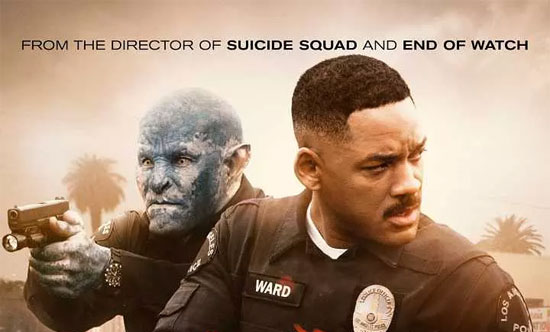
Looking at director David Ayer’s career—from screenwriter to director—he hasn’t produced any particularly outstanding work over the years. His two most notable films in recent times are Fury and Suicide Squad… So before watching, it’s important to have a basic expectation of the film’s quality—or does the Netflix brand combined with stars like Chris Hemsworth automatically guarantee a good movie?
[Friendly reminder: The following contains major spoilers.]
Getting back to the point, “Bright” actually has quite a few merits. Its most compelling aspect is undoubtedly its “contemporary fantasy” setting: humans, orcs, elves, and other races—including quite a few wild fairies—coexist, though their relationships are far from harmonious.
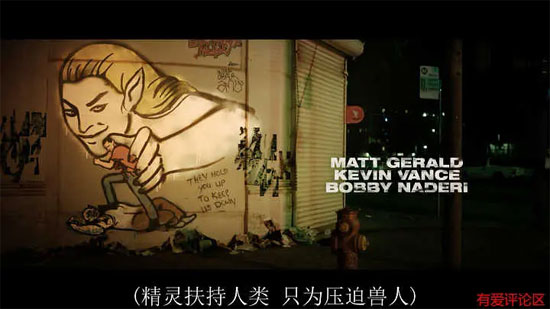
The graffiti scattered across the streets of Los Angeles in the opening sequence alone conveys the deeply entrenched racial issues plaguing this world.
Yet this world wasn’t always this way. It once witnessed the glorious “Age of Heroes,” a legendary era two millennia ago. In a time when people wielded bows, arrows, swords, and spears, the Nine Tribes fought side by side to defeat the Demon Lord, ushering in the present “Age of Peace.”
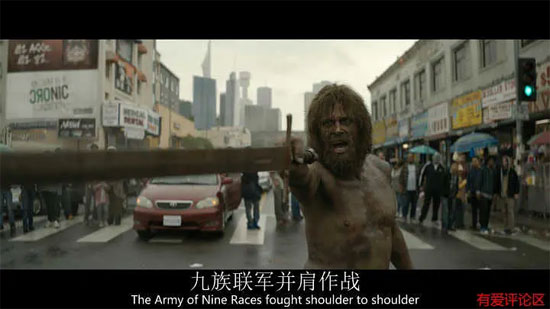
Simply put, “Bright” can be viewed as a futuristic, real-world take on “The Lord of the Rings”…
Building on this foundation, the plot weaves in the main storyline of the “Inferno Party” attempting to resurrect the Demon King using a magic staff, adding a layer of “fantasy” to what initially seems like a straightforward cop-vs-criminal tale.
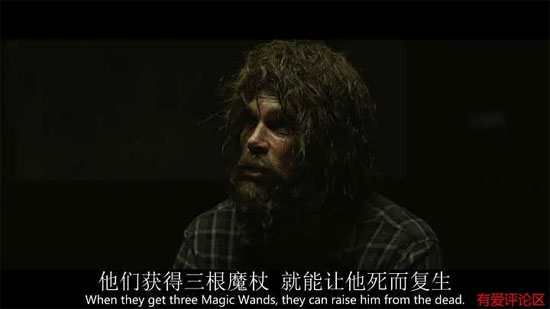
Many might find this “hybrid” setting peculiar, but personally, I find this blend of fantasy, action, crime, gunfights, and epic elements within an alternate world quite intriguing.
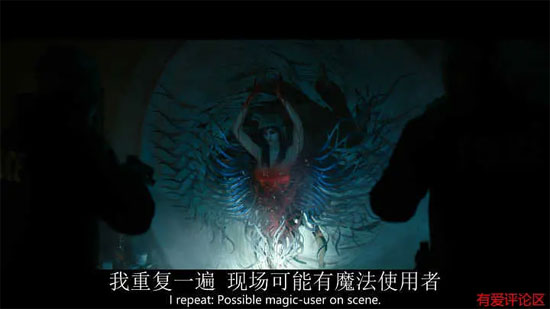
For instance, the scene where Tika severely wounds her pursuers with her wand possesses a distinct, otherworldly beauty—especially to the eyes of those living in a thoroughly “low-magic” or even “magic-free” secular society.
Additionally, one scene left a deep impression on me: a Los Angeles street half-bathed in bright lights, half-shrouded in pitch darkness. As police cars screech to a halt, a dragon soars beneath the full moon…
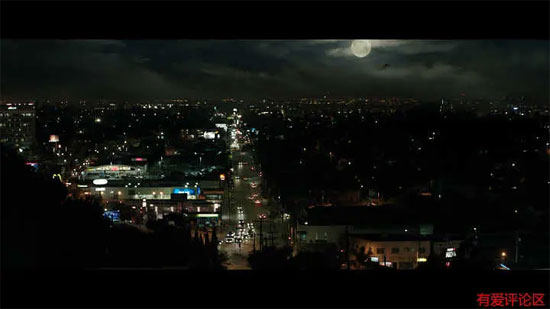
This is probably one of the most interesting scenes I’ve seen this year.
Beyond its novel premise, the film’s execution and exploration of themes are remarkably polished. For instance, when the protagonist Ward’s wife sends him to deal with the mischievous goblins causing trouble outside their house, it feels like a mundane task of shooing away pests or chasing off stray dogs…
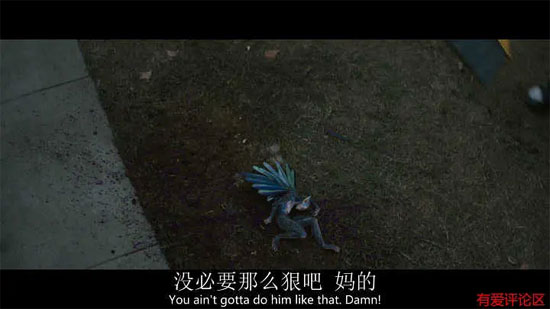
Of course, the element that truly elevates Bright’s thematic depth is its exploration of perennial social issues—despite the surface-level coexistence of different races, inherent racial characteristics perpetuate social stratification, fueling constant friction and conflict between groups.
This tension manifests in Ward’s attitude toward beastmen. On one hand, he adheres to politically correct values, teaching his daughter about racial equality with only slight variations. On the other, he genuinely resists accepting his superior’s assigned partner, the beastman Jacob.
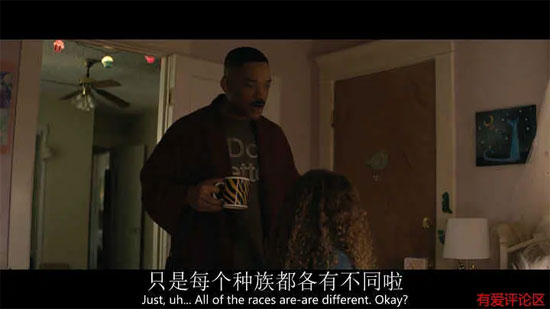
Ward’s hypocritical stance reflects the despairing social status of the orc race.
Jacobi, who never underwent the orcs’ distinctive “Blood Rite” and even filed down his fangs, harbors aspirations to be human and yearns to be different. He was specifically assigned by the city government as a figurehead for their “racial goodwill” image project… Jacobi’s actual circumstances are not hard to imagine.
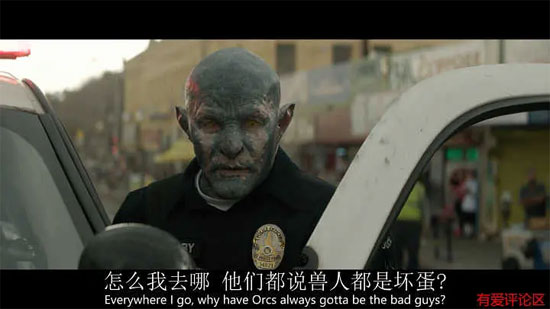
In this world, humans remained the same—neither truly elevated nor fully accepted. Orcs had become an inferior race, despised, looked down upon, and marginalized. Elves, however, held the highest power in society. Even the “Light Spirits” capable of wielding wands were almost exclusively elves.
As for the tropes of nobility and lowliness… well, it’s best left unsaid.
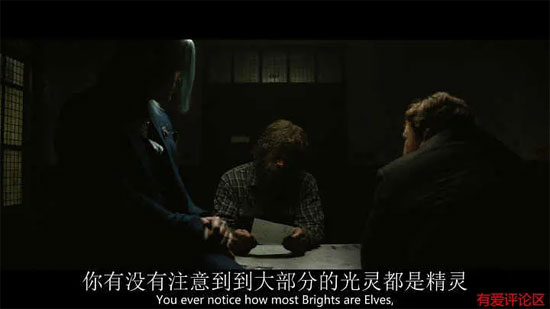
Jacoby’s cognitive positioning forms the film’s central narrative thread, with its associated dramatic conflicts evident and persistent throughout.
Due to his unalterable origins and appearance, Jacoby’s resolve and efforts are consistently overlooked. Orcs regard him as a traitor, while humans see him as a monster. Even Ward, who should trust him most, once harbored deep rejection and hatred toward him.
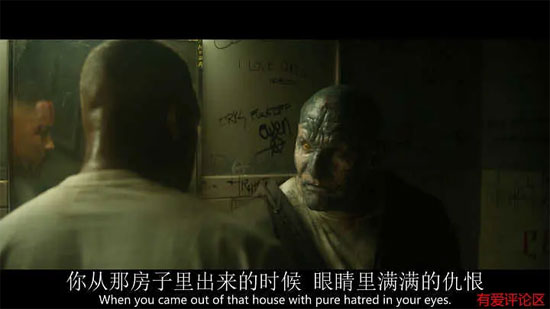
Yet it is precisely Ward’s uncompromising stance and their shared life-and-death experiences that forge a genuine friendship between these two once-divided souls.
In truth, Ward himself is an unwelcome figure within the police force—yet he possesses an unflappable presence and unmatched combat prowess…

This “familiar” aura was precisely what drew Jacobi to admire him.
By the film’s conclusion, the resurrected and refined Jacobi possessed courage and nobility worthy of respect across all races. Elves and humans alike regarded him with newfound respect, while even the beastmen honored him with a high-level “Blood Ceremony.”

From start to finish, everything seems neatly organized, with all the necessary elements in place. So where does “Bright” go wrong? It boils down to this: no matter how polished the formula, the story remains flat and even somewhat anticlimactic. The world-building feels top-heavy and underweight, revealing its most fatal flaw.
Yet the film’s ambition was undeniably grand, its scope expansive. In the end, it delivered only a mediocre tale. From Suicide Squad to Bright, David Ayer has consistently suffered from the same flaw: much ado about nothing. When expectations are so high only to be met with such disappointment, audiences are justified in delivering a punishingly low score. This one, David, you’ve got to take the fall for…

A pair of frustrated patrol officers stumble upon a renegade elf by accident, getting swept into a conspiracy that threatens the very foundations of the world. With agents from the Magical Federation hot on their heels, various factions take turns stepping into the spotlight…
The story unfolds smoothly enough, though it’s neither particularly clever nor original. One of the few laughs comes from Jacobi’s mastery of multiple languages.

In a crime-ridden modern Los Angeles, using a “magic wand that grants any wish” as the central plot device is a clever design. Beyond a handful of elves, the likelihood of humans possessing “light spirits” is minuscule—ordinary people touching the wand would simply vanish into dust.

This plants an unknown suspense, laying the groundwork for Ward’s unexpected use of the wand later—and clues hinting at this appear early in the film, showing considerable thought went into it.
Especially when Jacobi is resurrected by Tika, “Bright” drops a major red herring, deliberately pointing the “chosen one” label toward this beastman.
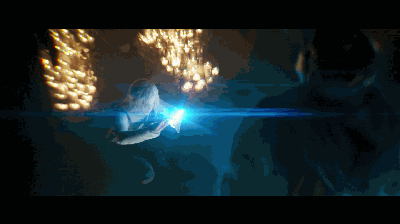
This implication grows even stronger during Ward and Jacob’s argument over “how to save Tika”—the reborn Jacob begins embracing destiny, while Ward is merely persuaded, half-heartedly going along with reluctance.
Theoretically, when Ward ultimately reveals his Light Spirit potential, the audience should feel surprised and excited.

Alas, the timing was perfect, but the main course fell short… After building such immense tension and hype, the payoff felt utterly underwhelming.
Take the main antagonists—the rebel spirits led by Elila. When they first appeared, they seemed invincible, unstoppable, and utterly dominant. Wiping out an entire gang’s armed forces was effortless for them.

As a result, the trio of protagonists—who had been fleeing for their lives from the gangsters—suddenly found themselves evenly matched against Lila and her crew, even managing to turn the tables in the end… The drastic drop in these elves’ combat prowess is simply too glaring. It’s not just inconsistent—it’s impossible to justify.
Ward’s climactic moment snatching the wand to defeat Lila should be the film’s peak, yet this final boss battle—after all the preceding hype—feels like it just fizzled out…

What follows is the obligatory happy ending.
The elf-human investigative duo approaches their human-beast partner, the patrol officer, and together they establish the “truth of the matter”: no magic wand, no light spirits—just a hard-boiled detective doing his duty.

Both the “good cop” and “bad cop” were honored as fallen heroes with grand funerals. Ward and Jacoby’s numerous violations were swept under the rug, and they were publicly recognized as model officers by the department.
It all felt so familiar—neither brilliant nor flawed… In short, a mediocre compromise.

It feels like singing a pop song: the intro is catchy, the lyrics are spot-on, and the delivery is solid. But halfway through the verse, the singer hits a note a pitch too high. Instead of correcting it, they plow ahead obliviously—only to completely lose their voice by the chorus…
Back to the title: This year has undoubtedly been a banner year for Netflix (and frankly, its momentum has been growing steadily in recent years)— —yet compared to its many excellent original series, the quality and reception of Netflix’s original films consistently fall short.
“Bright” is no exception. With such a malleable story setting and world-building, coupled with a substantial production budget, it feels like a waste to confine it to a single film. Had it been developed as a series, many underdeveloped elements could have received richer, more nuanced exploration.

After all, the “Dark Lord” hasn’t truly awakened yet. The conflicts and entanglements between humans, beastmen, elves, and other races are merely touched upon. The modern urban fantasy elements are just a fleeting glimpse—ending with a dismissive “F*ck magic” leaves you wanting more.
Please specify:Anime Phone Cases » Bright 光靈 2017 Film Review: It would be better if it were made into a TV series.